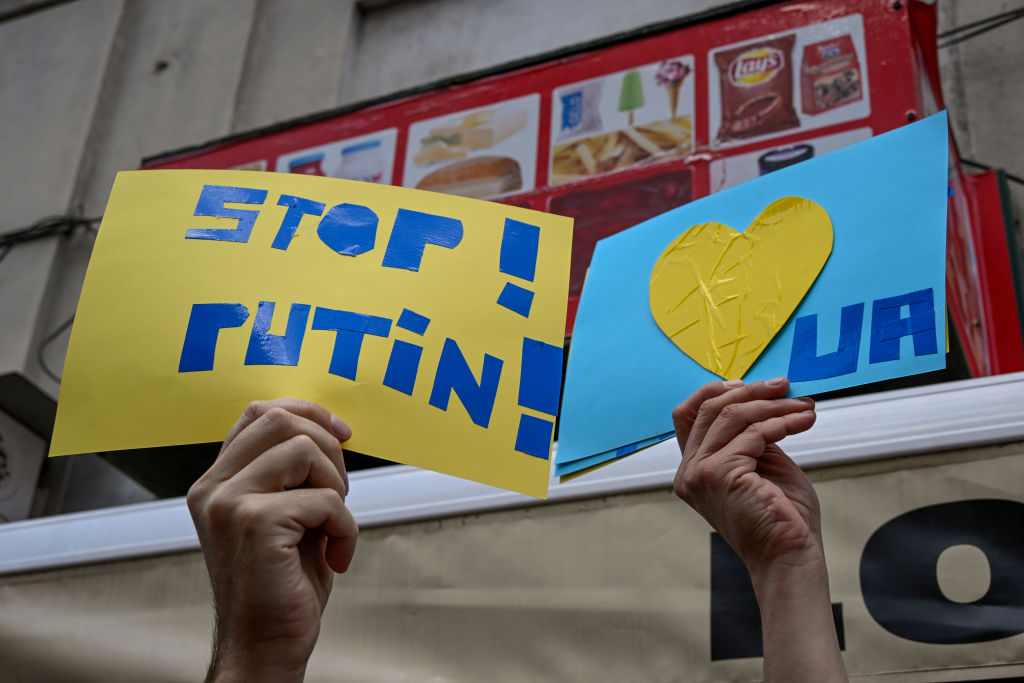
As Chinese President Xi Jinping visits the Kremlin this week, Russian expansionism is getting a tacit nod of approval. Vladimir Putin will likely emerge emboldened from the talks with his fellow President-For-Life, who previously promised a friendship “without limits.”
That is why the U.K. and its European partners must work far faster to develop a grand strategy for “re-containing” Russia in Ukraine and on three global fronts where Chinese support will help Putin advance: Africa, Central Asia, and, crucially, the Arctic.
“Containment” was first proposed by the American analyst George Keenan in 1946 as a strategy for a “long-term, patient but firm and vigilant containment of Russian expansive tendencies.” It later became the Truman Doctrine and today, we need the same approach again.
In Africa, Europe must now find a way to counter the brutal Wagner Group of mercenaries that has opened a second Russian front, especially in the Sahel. Controlled by Yvegeny Prigozhin, the Wagner Group is waging war in at least five African nations, runs social media influence operations in several more, and has knitted together illicit business networks that have helped channel over $250 million into Putin’s war coffers.
In Central Asia, that vast space once crisis-crossed by spies and soldiers in the 19th century “Great Game” between Britain and Russia, a new battle for influence is underway. Along Russia’s southern flank, former Soviet states are looking for new partners as its younger citizens seek education and opportunity in the West.
But closest to home is the Arctic, where Russia is reopening Cold War-era bases above the Arctic Circle and reinforcing the Kola Peninsula, home to the ballistic nuclear missile submarines that provide Russia’s “second strike capability.”
Here Russia is also advancing its claim to the Arctic’s 1,100-mile-long underwater Lomonosov Ridge that divides the Arctic Basin, and would hugely extend Russia’s sovereign rights to critical minerals—like palladium, cobalt, and nickel—providing the Kremlin with billions in new revenues.
And of course Russia is hard at work strengthening ties with a Chinese government that wants to create a “Polar Silk Road.” As the ice melts due to climate change, this will provide a summer sea-lane that will halve the time it takes for China to ship its goods worldwide.
The E.U. has clocked the threat. In Sweden’s parliament this month, I joined over 300 European lawmakers from over 30 countries who met E.U. officials in Stockholm to review the new risks and new measures needed to safeguard the High North.
Today, the region is effectively an ungoverned space without a framework of laws to guard against an arms race—or the accidents that might come with it. That is why, David McAllister, a German MEP who chairs the European Parliament’s powerful Foreign Affairs Committee, told us we can now expect the E.U. to put “more Europe in the Arctic—and more Arctic on the agenda of the European Union.”
This poses a challenge for the U.K. We are the Arctic’s closest neighbor. Last year, ministers declared that, because of climate change, “our national interest in the Arctic will only increase” and we anchor the Joint Expeditionary Force that coordinates military operations with most of the Arctic nations to NATO standards.
E.U. members’ growing alarm about the defense of the High North, together with the sheer complexity of coordinating counter-Russian strategy, demands new arrangements to undertake detailed foreign policy planning together with the E.U.
The Brexit deal struck by former Prime Minister Boris Johnson failed to include any formal mechanism for dialogue and cooperation on foreign policy matters. Since Russia’s full-scale invasion of Ukraine, the E.U. has repeated its willingness to create a supplementary agreement with the U.K. on foreign policy cooperation.
But the U.K. and E.U. have just shown an ability to forge closer ties, after Prime Minister Rishi Sunak struck the “Windsor Framework” earlier this month that helped resolve tensions over one of Brexit’s thorniest issues. As the Windsor Framework goes through the House of Commons this week, the U.K. and E.U. need to start talking about deepening foreign policy coordination for the years ahead.
The European Political Community that we have joined only meets twice a year and the U.K. remains largely outside the E.U.’s structures for defense industrial cooperation, like the European Defence Fund. This risks a degree of chaos that has been multiplied by the U.K.’s failure in its “integrated review” of foreign policy to produce anything resembling a strategy to guide its continental diplomats in their day-to-day work.
As one former U.K. National Security Coordinator told me, that is a problem for Britain because while ardent Brexiteers might not like it, Europe runs on process. And without a structured dialogue with our closest neighbors, the U.K. misses out on the chance to be inside the room when key foreign policy issues are discussed.
So while the bonhomie of the Windsor Framework still glows, it is time for the U.K. and the E.U. to start work designing a light-touch foreign policy council to serve as a flight deck for complex U.K.-E.U. operations like building early warning systems, improving sanctions enforcement, coordinating information warfare, or designing joint exercises with the U.S. Second Fleet. The list gets longer by the day. But as the China-Russia friendship deepens, there is not a moment to lose.
More Must-Reads from TIME
- Why Biden Dropped Out
- Ukraine’s Plan to Survive Trump
- The Rise of a New Kind of Parenting Guru
- The Chaos and Commotion of the RNC in Photos
- Why We All Have a Stake in Twisters’ Success
- 8 Eating Habits That Actually Improve Your Sleep
- Welcome to the Noah Lyles Olympics
- Get Our Paris Olympics Newsletter in Your Inbox
Contact us at letters@time.com